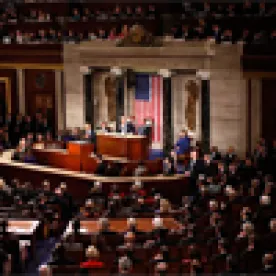Earlier this year, Senate and House Republicans introduced the “Separation of Powers Restoration Act of 2016.” On July 12, 2016, the House passed the bill by a vote of 240-171, largely along party lines.
The legislation would fundamentally alter a cornerstone of administrative law: Chevron deference. Chevron deference describes a doctrine articulated by a unanimous US Supreme Court in its 1984 decision, Chevron USA, Inc. v. NRDC. As the name suggests, Chevron deference requires courts to accept an agency’s reasonable interpretation of the ambiguous terms of a statute that the agency administers. The Court later extended that rationale to require that courts also defer to an agency’s interpretation of its own regulations, a doctrine commonly referred to as Auer deference.
The rationale behind such deference is that agencies–not courts–are in the best position to implement the complex technical regulatory schemes that agencies are tasked by Congress with implementing. Judges, in contrast, are not (normally) experts in technical fields, and are not part of either “political” branch of the Government. Practically, then, Chevron deference (and Auer deference) permit agencies to change their interpretations of ambiguous provisions in response to changing technological, social, or political circumstances.
The Separation of Powers Restoration Act of 2016 would amend the Administrative Procedure Act to require that courts decide “de novo all relevant questions of law, including the interpretation of constitutional and statutory provisions and rules.” Instead of deferring to agency interpretation, courts would be tasked with examining de novo (without deference) statutory language and agency rules. That is, as proposed, the statute would eliminate both Chevron deference and Auer deference–agency decisions about statutes and rules would be subject to de novo review. This would impact a wide range of agency action because Congress regularly drafts agencies’ mandates broadly, with Chevron deference in mind. It is unclear how de novo review might work in practice. But, at a minimum, the legislation would place courts at the center of controversial agency decision-making, and potentially discourage agencies from taking expansive interpretations of their statutory authority.
What Supporters Say
Utah Senator Mike Lee (R-Utah), one of the bill’s sponsors, argues that the legislation will “restore accountability to the regulatory process” and will “ensure proper judicial review.” Senator Lee contends:
For many years, the nation has witnessed a steady accumulation of power within administrative agencies. As a practical matter, agencies’ power to regulate and to adjudicate has supplanted the legislation and judicial review as the primary means by which governance takes place at the federal level.
As James Madison put it in Federalist 47, ‘The accumulation of all power, legislative, executive, and judiciary, in the same hands, whether of one, a few, or many, and whether hereditary, self-appointed, or elective, may just be pronounced the very definition of tyranny.’ By definition, the accumulation of power within administrative agencies represents a shift away from the constitutional separation of powers and the liberty it protects.
Supporters in the House of Representatives advance a similar argument. Representative John Ratcliffe (R-Texas) sponsored the legislation in the House because he believes it will “reduce the accumulation of power attained by regulatory agencies by restoring the power of the courts to interpret the law, instead of deferring to the interpretation of federal administrative agencies.” Representative Ratcliff also argues: “We must ensure the integrity of our three co-equal branches of government, and this legislation will stop administrative agencies from taking power the Constitution does not give them.”
In short, supporters argue that the Separation of Powers Restoration Act of 2016 will reinvigorate judicial oversight of agency action, and effectively restore the three branches of government envisioned in the Constitution.
What Opponents Say
On the other side of the aisle, opponents of the legislation worry that giving life-tenured federal judges veto power over administrative decisions will harm the American public by allowing those judges to second-guess the agencies with specialized knowledge. Representative John James Conyers, Jr. (D-Michigan), the longest-serving member of Congress, opposes the Separation of Powers Restoration Act of 2016 because he believes it will:
. . . make the already ossified rulemaking process even more time-consuming and costly, threatening the ability of federal regulatory agencies to protect public health and safety.
. . .
By eliminating judicial deference, the bill would effectively empower the courts to make public policy from the bench even though they lack the specialized expertise and democratic accountability that agencies possess, through delegated authority from and oversight by the American people’s elected representatives.
Echoing Representative Conyers’ sentiment, Representative Hank Johnson (D-Georgia) voted against the bill because it “will delay and possibly derail the ability of agencies to safeguard public health and safety.”
What’s Next
The bill must next pass the Senate before it will be put on the President’s desk. The website govtrack.us gives the legislation a 11% chance of being enacted. According to that website, the bill’s slim odds are based on a host of variables including: (1) the lack of cosponsors from both parties; and (2) the lack of a companion bill sponsored by another party.




 />i
/>i

